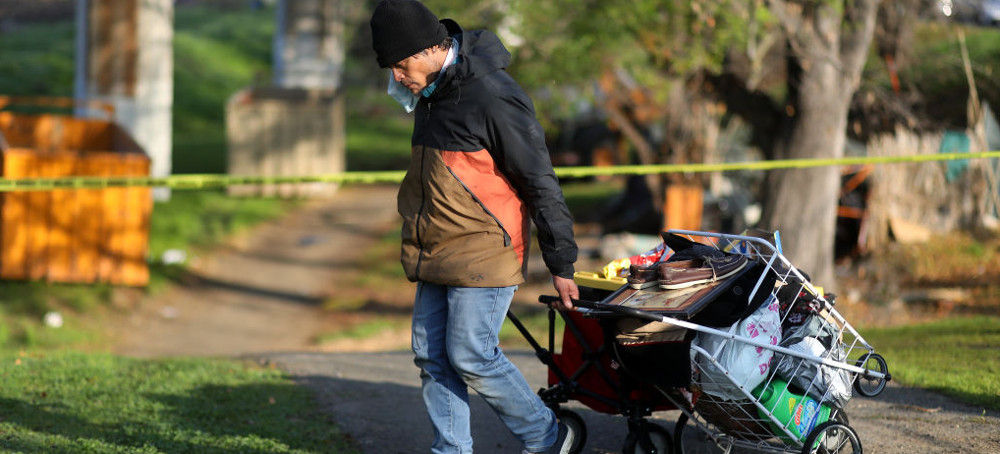Cities Are Spending More to Brutalize Homeless People Than It Would Cost to House Them
Luke Savage Jacobin A homeless man moves his belongings from an encampment in Concord, California, after city workers cleared the camp and removed structures from the property. (photo: Aric Crabb/Getty)
A homeless man moves his belongings from an encampment in Concord, California, after city workers cleared the camp and removed structures from the property. (photo: Aric Crabb/Getty)
Few scenes are as emblematic of the barbarism of American capitalism as the now-routine “sweeps” in which police round up homeless people and destroy their belongings. By some estimates, it would be cheaper to just provide them with housing.
Fueling the growth of encampments has (unsurprisingly) been a sharp increase in homelessness — itself driven by soaring rents and a chronically inadequate supply of affordable housing. According to one analysis from the National Law Center on Homelessness and Poverty, a single 5 percent increase in rents in a major city such as Los Angeles can force as many as two thousand people onto the streets. The same study found that the number of encampments nationwide rose some 1,342 percent between 2007 and 2017. Given the measurable increase in homelessness since, there’s every reason to believe the figure is even higher today.
In the wake of these developments, big city mayors and councils have leaned heavily on draconian law and order approaches that aim less to address the root causes of homelessness than the visibility of those experiencing it. Police raids on homeless encampments, usually called “sweeps,” often pair raw brutality with a dollop of paternalism as authorities insist (almost always erroneously) that evicted residents have subsequently been sheltered or placed in transitional housing.
As Eugene Stroman, a homeless resident of Houston explained in 2017, those living in encampments often have very good reasons to prefer encampments and refuse police offers of relocation to a shelter:
There are . . . reasons to say no when officers offer to bring you to shelter. Agreeing to go to a shelter in that moment means losing many of your possessions. You have to pack what you can into a bag and leave the rest behind, to be stolen or thrown away by city workers. For me, I would have lost my bulky winter clothes, my tent, my nonperishable food, and the bike parts I used to make repairs for money. You give up all this property just for the guarantee — if you trust the police — of a spot on the floor for one night. It’s not really a “choice” for me to give up all those resources. I needed to make smart survival decisions.
Contrary to what authorities claim, encampment sweeps have therefore done little except make life even harsher for the unhoused. Evidence is scant that encampments can actually be linked to increases in crime but, as Malcolm Harris observed last year, the homeless often serve as a convenient scapegoat for officials who would rather outsource social policy to bloated police departments than build public housing.
There is considerable evidence, however, that cities are in fact spending far more on criminalizing and displacing homeless people than it would cost to provide them with a place to live. The likes of sweeps, incarceration, enforcement of anti-panhandling laws, and hostile architecture, after all, come with a hefty price tag estimated to be more than $31,000 per person, per year. The annual cost of providing supportive housing, according to the same analysis, is $10,051 — or less than a third the cost of criminalization.
There is, in other words, nothing rational about the way America’s cities are opting to respond to homelessness. The hostile posture of local governments and police departments toward the unhoused reflects neither reason nor ineffective policymaking, but instead the disproportionate influence of affluent property owners on elected officials, the noxious reliance on policing as a panacea for social ills, a public policy consensus that continues to view housing more as a vehicle for speculative investment than a basic human need, and the wider hollowing out of America’s social contract all of this entails.
As the richest country in the world, America has at its disposal the resources and know-how to see every person housed and afforded the necessities of life. Allowing it to be otherwise is, quite simply, a choice.



